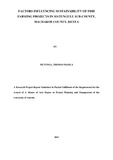| dc.description.abstract | Kenya is endowed with numerous aquatic resources with aquaculture potential. However, the ever increasing population is not in tandem with the rate of job creation hence slow economic growth and development. Farmers in suitable areas are turning into fish farming as a way of producing high quality food either for their families or for the market, and as a way of earning extra income. Sustainability of pond fish farming is in line with Millennium Development Goal number 1 which calls for reduction of poverty in the world by 50 percent by the year 2015 and also in the government’s agenda for National Development. The purpose of this study was to find out factors which influence sustainability of fish farming projects in Matungulu Sub-County an area that is traditionally not a fish farming area. The study sought to examine the influence of the project beneficiary’s demographic factors, financial stability, capacity building and land availability on sustainability of fish farming projects in Matungulu Sub-County. The target population of the study was fish farmers and Fisheries’ officials in Matungulu Sub-County. The study employed a descriptive survey design. Data was collected using questionnaires and analyzed using the Statistical Package for Social Sciences. From the study, Male who greatly thought that external sources of funds influenced sustainability of fish farming represented 57.6 per cent of the all the respondents. The study also found out that 53.9 per cent of the respondents who had received their initial startup capital from a co-operative society loan perceived external sources greatly influenced sustainability of pond fish farming. The study established that for the project beneficiaries who had employed fish farm attendants, 59.4 per cent noted that training was very useful in sustainability of fish farming and 69.1 per cent said external sources greatly influence sustainability of fish farming. More disaggregation showed that 61.8 per cent of the respondents who had received training through demonstration termed the training as very useful in sustaining fish farming, while 67.9 per cent thought external sources greatly influences sustainability of fish farming. The study further found that 61.8 per cent of the respondents who owned land also thought external sources influence sustainability of fish farming to a great extent and 55.2 per cent viewed training as very useful in sustaining fish farming. The study concluded that sustainability of pond fish farming in Matungulu Sub-County is greatly influenced by demographic factors, financial stability and capacity building of project beneficiaries and not land availability. The study recommends that the Government of Kenya should be more involved in provision of quality training programmes to fish farmers and encourage the youth to engage in fish farming as a way of job creation. The study suggests as an area for further research, that all the factors affecting sustainability of fish farming be investigated within a complete analytical framework, identifying the direct and indirect effects. Also a study should be conducted to access the efficiency of fish farm productivity and its sustainability. | en_US |

